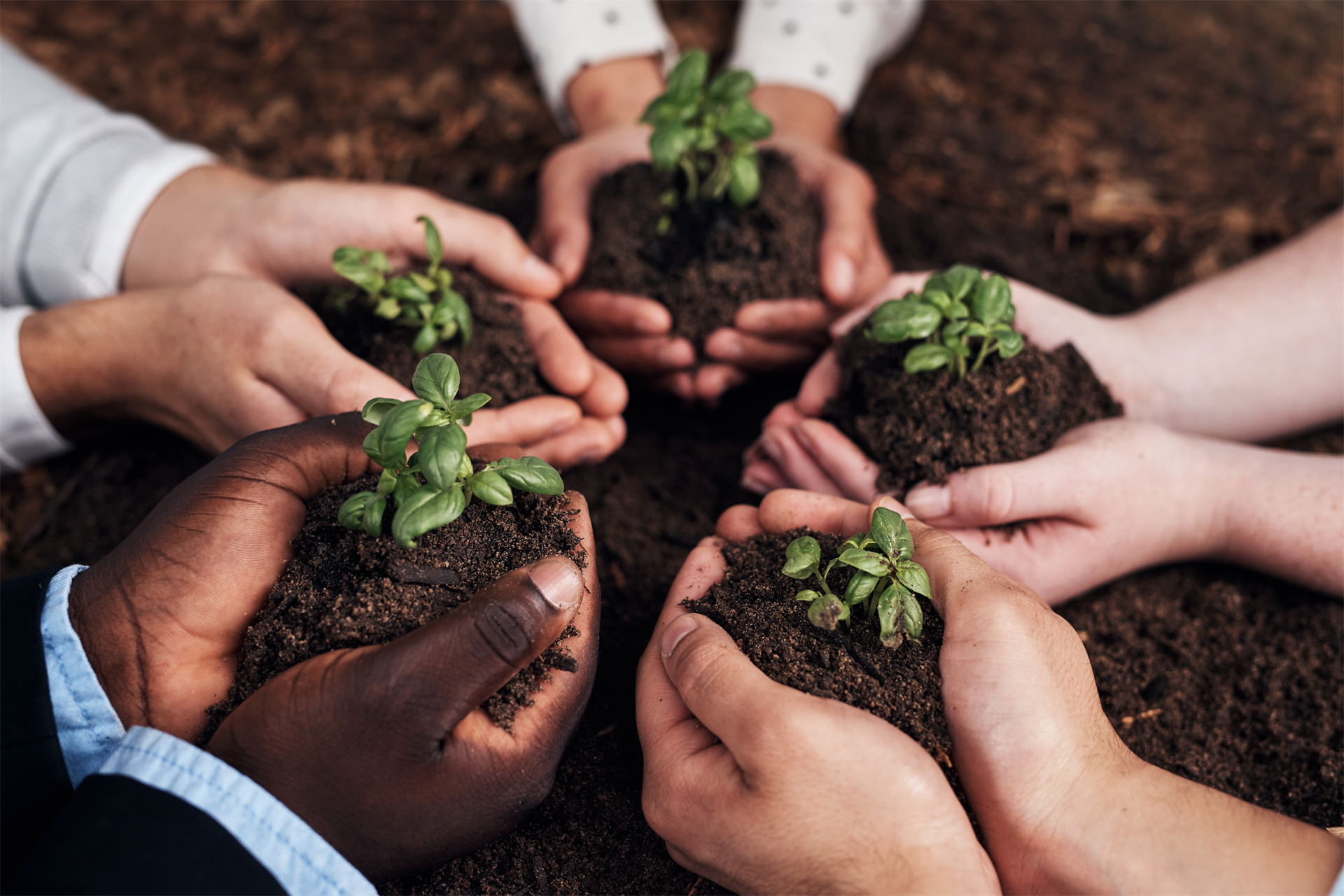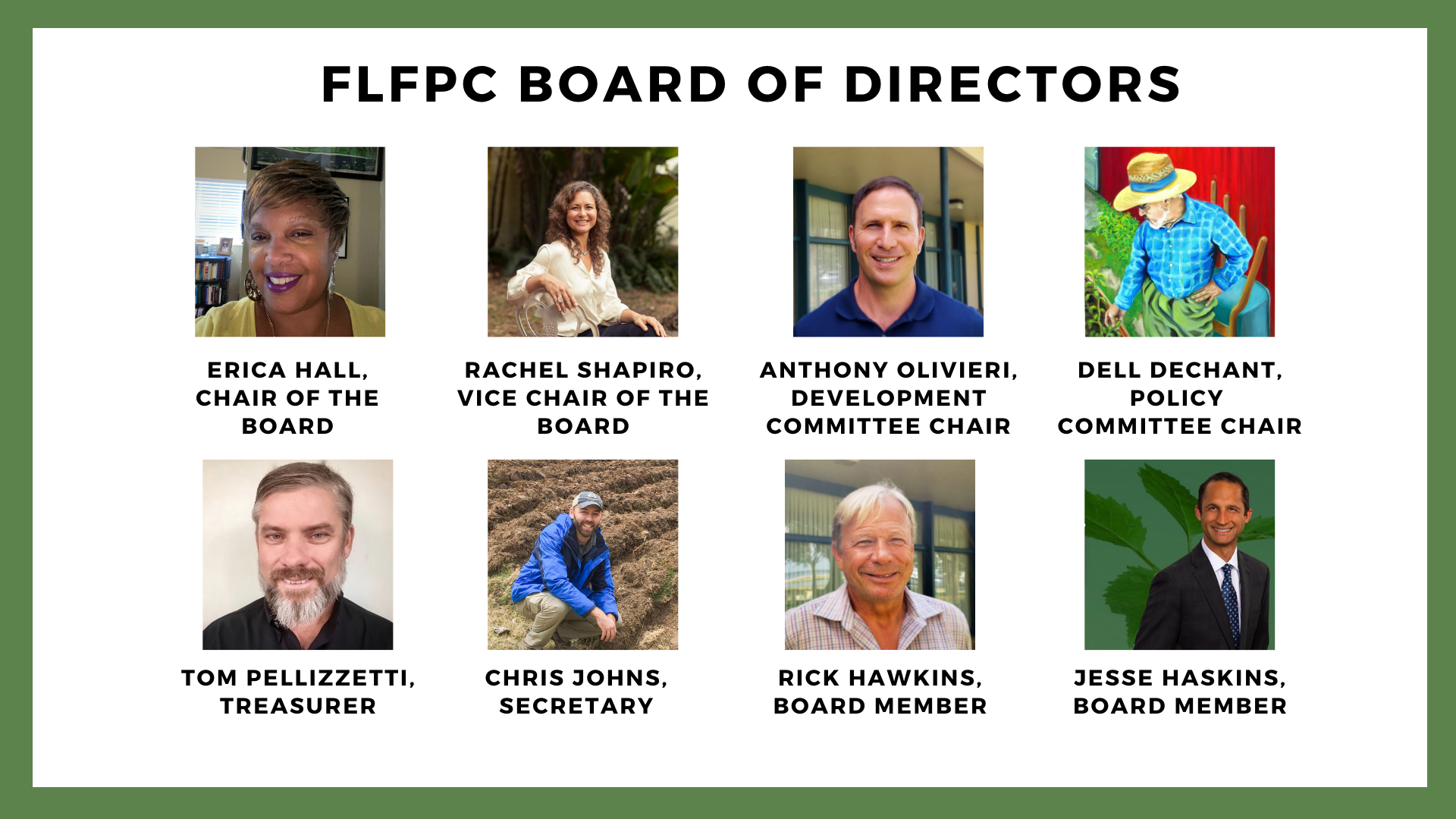
Follow Up: January Florida Food Forum
Building Bridges: Bettering Florida’s Food System Together
If you were unable to attend the meeting, the full presentation is available to watch online here.
To keep the conversation going, please visit our forum on Building Bridges: Bettering Florida’s Food System together here to add your thoughts and comments.
On Friday, January 29th, the Florida Food Forum on "Building Bridges: Bettering Florida's Food System Together" featured FLFPC Board Members Erica Hall, Rachel Shapiro, Anthony Olivieri, Dell deChant, Tom Pellizzetti, Christopher Johns, Rick Hawkins and Jesse Haskins, who discussed how they are building bridges in their respective areas of expertise to better the food system.
Dell DeChant, a native Floridian, explained that he has lived through Florida’s transformation from a “largely rural, lightly settled agricultural state, to one that is highly urbanized, densely populated, economically diversified, and ecologically compromised.”
Dell is a Master Instructor at the University of South Florida where he has served for 35 years. He researches religion in contemporary culture, using a “theology of culture approach.” He has published over 30 articles in professional journals and encyclopedias, presented over 40 conference papers and contributed chapters in 12 books, and has authored 3 books, one of the most popular being “The Sacred Santa: Religious Dimensions of Consumer Culture.” Dell is also the co-author on a text on comparative ethics titled Comparative Religious Ethics, a Narrative Approach. Most recently, he published an article entitled “Where’s the Beef? Looking for Food, Religion and Ecology,” in the book The Global Food System.
In addition to his academic career, Dell notes how he is active in his community. Serving two terms on the New Port Richey City Council, he initiated the city's first sustainability projects including mulch recycling, Tree City USA designation, recognition of Earth Day and Arbor Day. He served as Chair of the Environmental Committee, which was initiated in 1990, and chartered the first community gardens in New Port Richey. He spearheaded the drive to establish the Martin Luther King Day Celebration in the city, and continues to work to better Florida and his community by serving on the Board of Directors of Ecology Florida, the Pasco County Food Policy Council, and the Florida Food Policy Council.
Dell said that in his assessment of the contemporary food system, "the area which we see the greatest distortion is the area of food sovereignty and urban agrarianism, which are virtually overlooked in terms of policy and government action. Absent action in these areas as a culture We remain little more than a colony of the industrial food system.”
Anthony Olivieri, originally from Cambridge Massachusetts, moved to Florida in 1990. His expertise in Community Food Systems, mapping of food and health disparities, land use policy, food systems analysis, and food systems education, programs and workshops, has been greatly seen in his work with FLFPC.
In 2012, for the first time Anthony created a map of diabetes in Broward County, a project which catalyzed a number of programs and policy change in the county. His research found that in Broward, cases of diabetes overlapped almost exclusively with low-income Black communities, and those areas also overlapped with an unhealthy food index that was created with funding by the CDC.
Most recently, Anthony has been working on a project on health disparities and COVID. This type of analysis as well as Land Use Policy analysis is a unique skill that he brings to FLFPC. In fact, he worked with the council to develop a process and analyze 6 counties around the state of Florida, discovering 152 policies that relate to food access and food recovery.
Another project Anthony helped develop was the creation the “Good Neighbor Store Initiative,” with Arely Lozano, which trained high school and middle school youth to analyze the food environment in their corner stores, how to map the information and how to present that information to the city council to advocate for policy change. Going forward, program implementation and opportunities to work with partners on program development and policy scanning is a high priority.
Rick Hawkins has spent more than 46 years in the hotel and restaurant industry. During that time, he was the Director of Materials Management for the Breakers Hotel and led the Environmental Impact Team which worked to bring the company to the forefront of sustainability.
He currently owns a small ranch where he raises beef cattle, chickens, fruits and vegetables, and he has spent much of his life involved in the food system growing sustainable and organic food and connecting growers to eaters.
“In Florida,” Rick said, “there is a large disconnect between the people that grow the food and the people who eat the food. A lot of his time has been spent trying to help that.”
In 2007, Rick co-founded the not-for-profit LocalEcopia, along with Geoff Sagrans, the long-standing President, with the goal of helping sustainable business operations by eliminating the disconnect between growers and eaters. Similarly, at the Breakers Hotel, Rick was able to connect with local chefs to create agreements with local farmers to bring in fresh produce every week which in turn provided stable income to the farmers and also offered hotel employees the opportunity to obtain fresh Florida foods.
With COVID, however, LocalEcopia has especially faced great challenges without the demand from local consumers such as schools and hotels.
Jesse Haskins is an attorney based out of Tampa who has a strong passion for eating food, which has fueled his passion for engaging with professional organizations and broader food systems.
As the Year in Review Chair of the Agricultural Management Section of the American Bar Association’s Section on Environment and Energy Resources, he explained that, “agricultural Management is recognized as one of several different areas in resources, environmental law, energy law. I’m in charge of highlighting, mostly on the federal level, all of the developments that are going on in terms of agricultural policy.”
Jesse also takes pride in his community-level work with growers and entrepreneurs, making sure that they are in compliance with regulations and that they have the transactional infrastructure they need to thrive as businesses and entrepreneurs, particularly when it comes to municipal and zoning regulations, and also raising capital. Working with Farm-to Consumer Legal Defense Fund (FTCLDF) for herd share agreements is another area Jesse has experience in, where he helped consumers can get direct access to dairy from ranchers on a more local level.
Apart from his position on FLFPC’s Board of Directors, Jesse serves a Board member of Ecology Florida and Florida Organic Growers.
Tom Pellizzetti came to FLFPC while he was working in small farm meats in Florida. Ten years prior, with his background in marketing and sales in consumer products, Tom began doing independent sales activities. At that time, by connecting with growers and customers, it became quickly clear that there was no way to “raise, process and sell cattle in Florida.” He realized that this was because of a lack of infrastructure both with cattle and other foods as well.
Tom brings to the Board his experience of being in the commercial space. He connects food producers and brands with distributors while maintaining focus in that space, and stays closely tied into the activities on the ground. As a member of FLFPC, he said that he has been able to continue his passions in small farm to local food systems.
“FLFPC is a great place to participate,” said Tom, “to find voice and pick up on cool ideas.”
Tom wants to continue to generate revenue and improve FLFPC’s resources and tools. At the same time, he hopes to monetize and give voice to local food people and have an avenue for every day folks to be involved in the conversation.
Rachel Shapiro, lives in South East Florida in Palm Beach County. Rachel’s current project is the creation of a Food Hub named “The Feast” in Fort Lauderdale.
“The Food Hub is all about building bridges and solving challenges within the food system,” said Rachel. “My involvement in the food hub has grown out of my involvement with FLFPC and the other Board members over the past decade.” Rachel notes how she is incorporating the work Anthony has done on the “Good Neighbor Store Initiative” to influence nutrition guidelines, and building on the work Rick has done with LocalEcopia to make it easier for small to midsize producers to get their food to the folks that really want to get it.
“We know that the food system is a multi-faceted animal.” Rachel explained that with an uncertain job market, the high failure of food-related businesses, and now with COVID and the new landscape it has created as far as food production, delivery and job loss, the hub is a tool to address these problems.
“By encouraging entrepreneurship and focusing on services being offered, the hub is offering people another option as far as revenue generating facilities,” she said. Meanwhile, “providing a shared-use kitchen, a demo studio, and food hall, culinary entrepreneurs will be able to get off the ground at lower cost…We also have sourcing guidelines and are creating buying clubs to lower the cost for chefs and support the local farms.”
Going forward, Rachel hopes to continue to develop one of the main focuses of FLFPC, which is to bring together residents from around the state and bridge the gaps in the food system together.
Christopher Johns, a native Floridian, came from a traditional farming background. His family owns a farm in Hastings, which Chris had managed for a number of years before becoming an attorney in environmental law. He explained that seeing a lot of the environmental issues related to farming was the catalyst that made him want to enter law school.
“I would notice that the different stakeholders in the groups, such as farmers and environmental non-profits, often didn’t seem to understand each other…Then while I was in law school, I had the chance to intern at the Harvard Food Policy and Law Clinic, which opened my eyes to food policy.”
Until that point, he had thought of food as agricultural-centric, but when he was introduced to the concept of food systems, that helped him understand the broader context in which agriculture sits—a framework which allowed him to see potential issues with food systems and feeding people that he hadn’t seen before.
Chris is currently working on two projects that relate to food systems. The first is the Florida Food Policy Toolkit which is going to be an introduction to and overview of the legal and regulatory framework in Florida as it intersects with food systems. It will also be a compendium of information for people who are involved in various areas of food systems in Florida such as production, distribution, community food assessments, etc.
“With the help of volunteers, are currently compiling this information and are building a database and resources that will become tools for Floridians to use to better understand and advocate for healthier food systems.”
The second project Chris is working on is a Whitepaper exploring the ways to allow urban agriculture to proliferate and flourish without harming protections that are established for urban agriculture.
Erica Hall, who took over the role as Chair of the FLFPC 3 months prior, was the last to present.
“In light of the pandemic, and racial and social injustice, more than ever there is a connection and our work is intersectional,” she began.
Erica explained that intersectionality—an analytical framework for understanding how aspects of a person's social and political identities combine to create different modes of discrimination and privilege (such as gender, caste, sex, race, class, sexuality, religion, disability, physical appearance, and height)—is a framework that attempts to restructure the ways in which food is distributed, consumed, and produced, impacting the social, racial, cultural, political, economic, and environmental dimensions of food.
“Thus, a racial and social equity lens should be used in every aspect of each intersection of the work as intersectionality centers social justice from various social locations. And that without the input or understanding of resistance from the people whose experiences of injustices we seek to alleviate, we risk reproducing structures that reinforce oppression through different means.”
Erica noted that conversations around Justice, Equity, Diversity and Inclusion (JEDI) have to take place in safe places to facilitate change, and that is a priority for the council going forward. “The world needs a food system that delivers healthy, safe and nutritious foods to everybody, everywhere; and ensures a decent income for farmers and food workers, tackles climate change, and protects nature while building a community of practice all while working through a JEDI lens.”
Working to bridge these gaps, Erica has been collaborating with a number of organizations across the state. She was elected Vice-Chair of the Executive Committee, Sierra Suncoast Group working on the connection between Climate Change, Food Waste, Environmental Justice, and Diversity Equity and Inclusion; appointed by Nikki Fried to the Florida Department of Agriculture and Consumer Services’ (FDACS) Food Security Advisory Committee (FSAC), a core group of collaborative, cross-sector thought leaders across the state of Florida working together to create a statewide plan for addressing food security; works on the Executive Committee, Leadership Circle for The North American Food Systems Network (NAFSN); is assisting the chapter of the Congress for New Urbanism (CNU) with planning their CNU Florida Summit 2021, integrating Racial Equity and Justice into their summit which focuses on human-scaled urban design; presented with the Indian River Food Policy Council to Indian River stakeholders on the need for and the development/expansion of the Indian River Food Policy Council; is submitting expressions of interest to contribute to the textbook Food Studies: Matter, Meaning & Movement; and is a member of the Food Politics Action Team League of Women Voters of the St. Petersburg Area.
Erica also highlighted FLFPC’s plan to partner with FDACS and other groups to create GIS story maps throughout the State, highlighting social, racial and health disparities and inequities.
What are the next steps?
Erica ended her presentation by explaining how intersectionality is all about collaboration. That partnerships are key, and through developing those partnerships with other people and organizations, help in funding will follow.
“Become leaders in your community. Educate and advocate for yourselves and others. Join groups like ours—the Florida Food Policy Council. Reach out to us and tell us how can we help you reach your goals. Are there ways for us to collaborate and partner?”
With the conclusion of the presentations, a number of Board members stayed after to answer questions and discuss ways to collaborate.
If you would like to contact FLFPC, reach out to us at info@flfpc.org.
Guest Presenter Information:
Please visit our Board of Directors and Team About Page for full bios.

Forum Host: Dell deChant is the Associate Chair of the Religious Studies Department at the University of South Florida and a member of the Board of Directors at the Florida Food Policy Council.
Thank you to our sponsors for making this forum possible:
 FHEED provides food systems planning, GIS analysis, advocacy, and education about food systems and healthy communities.
FHEED provides food systems planning, GIS analysis, advocacy, and education about food systems and healthy communities.
Contact: Anthony Olivieri, Founder, FHEED LLC
Website: www.FHEED.com
 J Haskins Law, located in Tampa, empowers communities with the legal and risk management tools they need to exercise food sovereignty. The contact for J Haskins Law is Jesse Haskins.
J Haskins Law, located in Tampa, empowers communities with the legal and risk management tools they need to exercise food sovereignty. The contact for J Haskins Law is Jesse Haskins.
Contact: Jesse Haskins, Founder, J Haskins Law
Website: www.jhaskinslaw.com
The Florida Food Forum is a free event. To support our work, please consider becoming a member or making a donation. For questions or more information, contact us at: info@flfpc.org
Disclaimer: The views of the presenters do not represent the views of the Florida Food Policy Council. We are a forum for the offering and sharing of information and encourage diversity and communication within the food system.